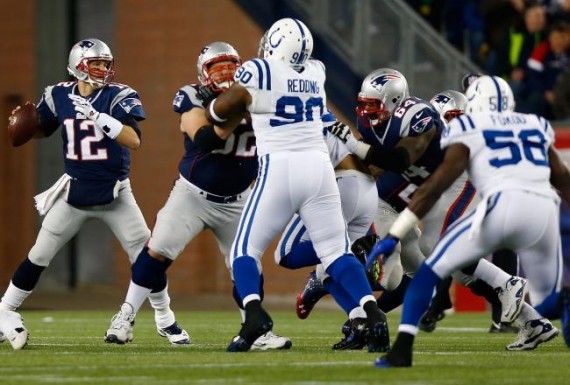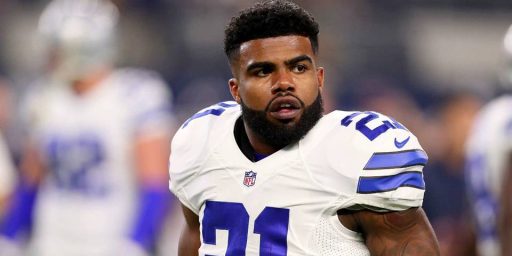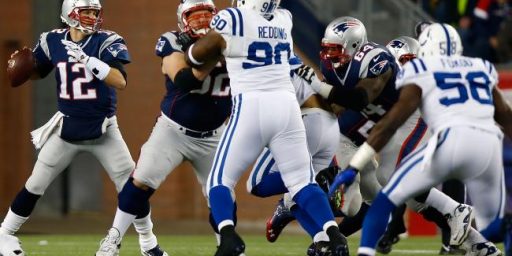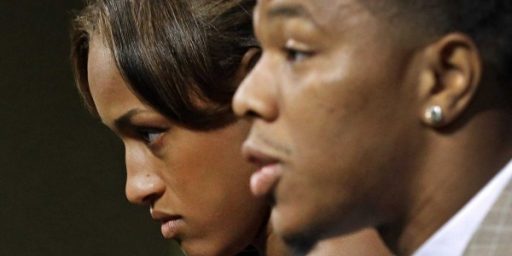Appeals Court Reinstates Tom Brady’s Deflategate Suspension
A Federal Appeals Court has reinstated the four game suspension imposed on Tom Brady over the so-called 'Deflategate' scandal.
A Federal Appeals Court has overruled a ruling by a Federal District Court Judge and reinstated the four game suspension that N.F.L. Commissioner Roger Goodell imposed on New England Patriots Quarterback Tom Brady over the so-called “Deflategate” scandal:
Tom Brady might serve his four-game suspension after all.
In a 2-to-1 decision, a panel of the United States Court of Appeals for the Second Circuit in Manhattan on Monday reinstated the suspension of Brady, the New England Patriots quarterback. Their ruling overturned a lower-court decision that had voided the N.F.L.’s suspension.
Brady’s lawyers had argued that he was unfairly suspended for his involvement in a scheme to deflate footballs used in a playoff game, and last summer, a Federal District Court Judge, Richard M. Berman agreed, allowing Brady to play the entire 2015 season.
The N.F.L. appealed that ruling to the Second Circuit, which heard oral arguments in early March. The judges were openly skeptical of many of the arguments made by Brady’s lawyer, signaling that they sided with the N.F.L.’s case that Commissioner Roger Goodell had broad discretion to suspend players.
In their decision, the judges did not consider the much discussed underlying facts of the case, including the science of football deflation, but looked solely at whether Goodell, as arbitrator, acted in the spirit of the collective bargaining agreement.
“We hold that the commissioner properly exercised this broad discretion under the collective bargaining agreement and that his procedural rulings were properly grounded in that agreement and did not deprive Brady of fundamental fairness,” Judges Barrington Daniels Parker Jr. and Denny Chin wrote in their opinion. “Accordingly, we reverse the judgment of the district court and remain with instructions to confirm the award.”
Chief judge Robert Katzmann dissented.
Brady’s lawyers can still appeal the decision to the full Second Circuit, or even the Supreme Court. Legal experts say both attempts would be long shots.
The Second Circuit made “the right ruling that conforms to a very well established pattern in the labor law,” said Michael LeRoy, who teaches labor law at the University of Illinois at Urbana-Champaign. Brady’s chances “of succeeding are close to nil.”
(…)
The judges, though, said that despite the protestations of Kraft, Brady and the N.F.L. Players Association, Goodell was merely acting on the powers the league and union agreed to in their labor deal, the latest of which was signed in 2011. The judges acknowledged that the management-union pact in which the person who penalizes players also listens to appeals of those penalties might be unconventional, but they would not get in the way of a longstanding and transparent contract.
“In their collective bargaining agreement, the players and the league mutually decided many years ago that the commissioner should investigate possible rule violations, should impose appropriate sanctions, and may preside at arbitrations challenging his discipline,” the judges wrote. “Although this tripartite regime may appear somewhat unorthodox, it is the regime bargained for and agreed upon by the parties, which we can only presume they determined was mutually satisfactory.”
The N.F.L. hailed the decision: “We are pleased the United States Court of Appeals for the Second Circuit ruled today that the commissioner properly exercised his authority under the collective bargaining agreement to act in cases involving the integrity of the game,” it said in a statement. “That authority has been recognized by many courts and has been expressly incorporated into every collective bargaining agreement between the N.F.L. and N.F.L.P.A. for the past 40 years.”
The N.F.L. Players Association said it was disappointed. “We fought Roger Goodell’s suspension of Tom Brady because we know he did not serve as a fair arbitrator and that players’ rights were violated under our collective bargaining agreement,” it said in a statement.
In his dissent, Judge Katzmann said that Goodell had overstepped his role as arbitrator by changing his reason for penalizing Brady after he had heard the quarterback’s appeal. Initially, Goodell suspended Brady for his role in the plot to deflate footballs, then argued that Brady had obstructed the league’s investigation of the incident by destroying his cellphone, which may have contained messages between Brady and members of the Patriots’ staff.
“When the commissioner, acting in his capacity as an arbitrator, changes the factual basis for the disciplinary action after the appeal hearing concludes, he undermines the fair notice for which the association bargained, deprives the player of an opportunity to confront the case against him, and, it follows, exceeds his limited authority under the C.B.A. to decide ‘appeals’ of disciplinary decisions.”
The N.F.L. Players Association said it was disappointed with the decision. “We fought Roger Goodell’s suspension of Tom Brady because we know he did not serve as a fair arbitrator and that players’ rights were violated under our collective bargaining agreement,” it said in a statement.
If Brady’s suspension is not overturned by a higher court, he will presumably sit out the first four games of the season. The Patriots play their opening game in Glendale, Ariz., against the Cardinals, and their next three games at home, in Foxboro, Mass., against the Miami Dolphins, Houston Texans and Buffalo Bills. Brady would then be eligible to return in Week 5, when the Patriots travel to Cleveland to play the Browns.
More from ESPN:
A federal appeals court has ruled that New England Patriots quarterback Tom Brady must serve a four-game Deflategate suspension imposed by the NFL, overturning a lower judge and siding with the league in a battle with the NFL Players Association.
“We hold that the Commissioner properly exercised his broad discretion under the collective bargaining agreement and that his procedural rulings were properly grounded in that agreement and did not deprive Brady of fundamental fairness,” the 2nd U.S. Circuit Court of Appeals ruled Monday in a 2-1 decision in New York.
Brady, however, is not prepared to accept Monday”s appeals court’s ruling and is exploring all his legal options with his attorneys, sources told ESPN NFL Insider Adam Schefter.
The decision by a three-judge panel may end the legal debate over the scandal that led to months of football fans arguing over air pressure and the reputation of one of the league’s top teams. It is also likely to fuel a fresh round of debate over what role, if any, the quarterback and top NFL star played in using underinflated footballs in the AFC Championship Game in January 2015. The Patriots won the contest over the Indianapolis Colts and then won the Super Bowl.
“Our role is not to determine for ourselves whether Brady participated in a scheme to deflate footballs or whether the suspension imposed by the Commissioner should have been for three games or five games or none at all. Nor is it our role to second-guess the arbitrator’s procedural rulings,” Judge Barrington D. Parker wrote in the majority opinion. “Our obligation is limited to determining whether the arbitration proceedings and award met the minimum legal standards established by the Labor Management Relations Act.”
The 2nd Circuit said the contract between players and the NFL gave the commissioner authority that was “especially broad.”
“Even if an arbitrator makes mistakes of fact or law, we may not disturb an award so long as he acted within the bounds of his bargained-for authority,” the court said.
(…)
The panel on Monday said the league’s discipline was properly grounded in the collective bargaining agreement and that Brady was treated fairly. Chief Judge Robert Katzmann dissented.
“I am troubled by the Commissioner’s decision to uphold the unprecedented four-game suspension,” Katzmann said. “The Commissioner failed to even consider a highly relevant alternative penalty.”
The appeals court settled the issue well before the start of the 2016 season, avoiding the tension built last year when Brady didn’t learn until a week before the season that he would be allowed to start in the Patriots’ opener.
At oral arguments in March, appeals judges seemed skeptical of arguments on Brady’s behalf by the NFLPA.
Circuit Judge Denny Chin said evidence of ball-tampering was “compelling, if not overwhelming” and that there was evidence that Brady “knew about it, consented to it, encouraged it.”
The league argued that it was fair for Goodell to severely penalize Brady after he concluded that the prize quarterback tarnished the game by impeding the NFL’s investigation by destroying a cellphone containing almost 10,000 messages.
Parker said the cellphone destruction raised the stakes “from air in a football to compromising the integrity of a proceeding that the commissioner had convened.”
“So why couldn’t the commissioner suspend Mr. Brady for that conduct alone?” he asked. Parker added: “With all due respect, Mr. Brady’s explanation of that made no sense whatsoever.”
Parker also was critical of the NFL at the arguments, saying Brady’s lengthy suspension seemed at “first blush a draconian penalty.”
The options for Brady and the NFLPA going forward are extremely limited and don’t seem likely to succeed. One option would be to seek a rehearing of the case before the full Second Circuit, something that is entirely discretionary on the part of the Judges on the Court and typically decided by a vote among the active Judges on the Court at the time. Granting of such en banc appeals is rare, but if it is granted one impact would be that the ruling of the three judge panel would be vacated and the case would move forward with a new round of briefing and argument before the full court. In the meantime, the decision of the District Court would be reinstated and Brady’s suspension once again on hold. The party who receives an adverse ruling from the full Court could then seek review from the Supreme Court, but given the logistics of a full Circuit Court hearing it’s likely that any ruling on the matter might not come until well into the 2016 N.F.L. season. Alternatively, Brady and the NFLPA could seek review by the Supreme Court directly, along with requesting a stay pending the outcome of that petition. There’s no guarantee that the Supreme Court will accept the case for appeal, of course, and if it does not then that will be the end of Brady’s legal options in the case. Finally, it’s possible that Brady could decide to just take the suspension rather than continue with legal arguments, but one suspects that both he and the NFLPA will likely try to challenge this ruling if only because of its expansive view of the powers of the Commissioner under the current Collective Bargaining Agreement.
If this decision is allowed to stand in the end, then it seems likely that it will become the impetus for what could be the central dispute between the NFL and the NFLPA when the Collective Bargaining Agreement comes up for renegotiation. In a sense, it is just the latest example in a series of disciplinary cases in which the authority of the Commissioner has come under criticism due to a perceived lack of objectivity in the process. The fact, for example, that the Commissioner presently has the authority both to impose punishment in a case such as this and to arbitrate the appeal o any such punishment is something that the NFLPA seems likely to object to going forward regardless of what happens to Tom Brady’s case, and it does seem as though their complaints have merit. It seems inconceivable that Roger Goodell is authorized to rule on the appeal of decision that he made, but it also appears that this is perfectly permissible under the current labor agreement. How far the NFLPA might be willing to go to try to change that is, of course, another issue.
In any case, while there are still some legal options left it does appear that Brady will have to serve a suspension that, in retrospect, now seems draconian. The only question will be which our teams will be the ones lucky enough to face a Brady-less Patriots squad.
Here’s the opinion:





Someone told me he re-did his contract so that he will lose minimal money this year because because of this…and then makes it back next year.
4 of Tom Brady’s game checks add up to real money.
Don’t know if that’s true or not…but smart if it is.
It’s just SO UNFAIR!!!! (Imagine feet stomping and hair pulling.)
Draconian? It’s 4 games.
And if he’d served it last year, he would be done.
Don’t you usually only get an en banc decision when the original 3-judge panel gives something that could be considered “broad band” (e.g. Yes No Dissent)? At least that’s how I’ve seen it work in IP law.
Think about this: Quarterback Brady is given a four game suspension for taking air out of a football. A “professional” NHL player beats some player up and gets a five minute water break sitting in a “penalty” box. Something is wrong here. Durant got kicked out of a basketball game the other day for a “flagrant” foul. How about that ?
How does a Federal judge get jurisdiction on the athletic field ?
If that is the case, I want a judge to take a look at the current strike zone. Maybe even get down there and call a game. I want to see those judgment skills in action. How about this strange infield fly rule ? Let’s get an opinion on that.
@Tyrell: And get off my lawn, you hoodlum kids!
It’s on the internet, it must be true!
The curious American justice system. The result doesn’t matter as long as due process was followed.
Goodell is wrong – just like every person you’ve ever met or read about who decided all the accusations must be true because you don’t like Brady.
To be clear: I don’t like Brady and I never will – I’m proud to be both an Ohio State fan and a Browns fan. [And the Browns get the Pats in game5 next year, Brady’s first game back. Outstanding.]
However, science is objectively correct whether you like it or not!
Carnegie Mellon study
MIT professor lectures on Deflategate
Collating all the evidence and links
1) Ideal Gas Law [Physics 101] shows Goodell is objectively wrong.
2) Watch the MIT professor. When you’re about to object – remember this: He’s right, and you’re wrong.
Whose balls actually did not match the Ideal Gas Law? The COLTS – not the Pats.
Deal with it.
I have talked to some former players who prefer it the other way – more air, especially kickers. The temperature, sun, humidity, altitude, and rotation of the earth can also have an effect.